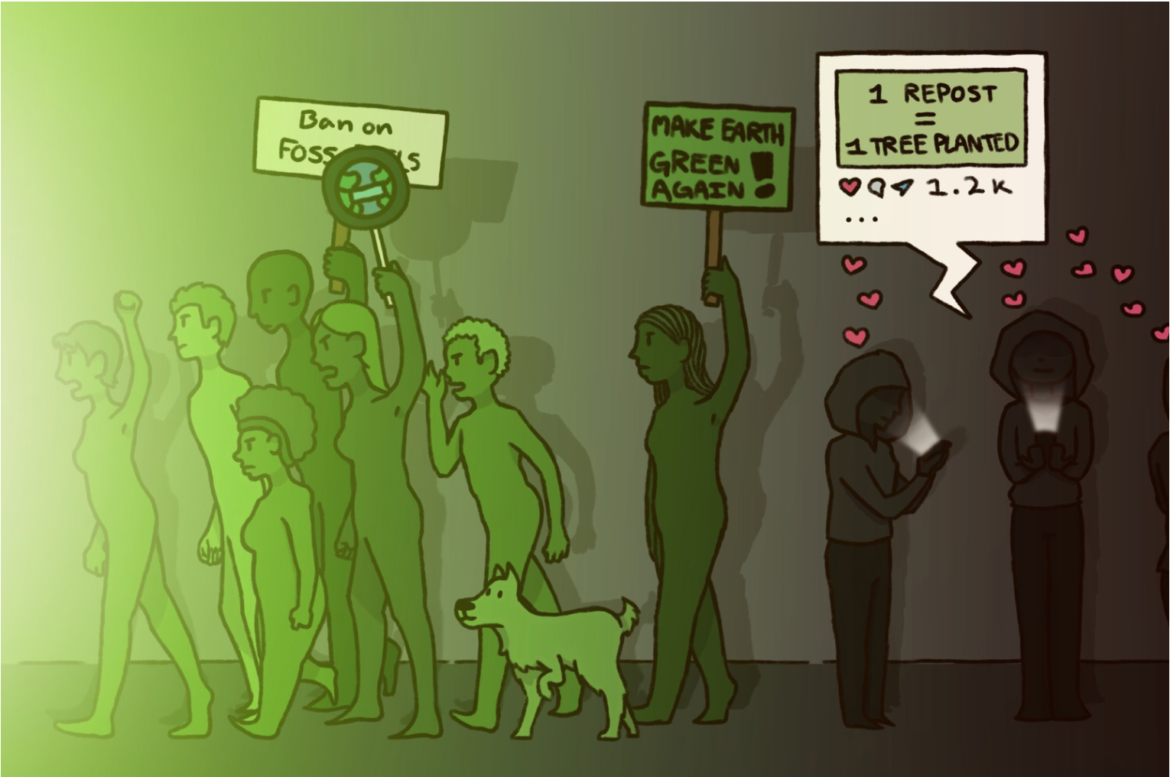A group of activists working together march toward progress with sustainability and climate change solutions, but those who attempt to engage online are isolated from them. Activism on social media often stems from performative motives and often fails to incite social change. “Although it may seem like reposting colorful illustrations demanding justice for George Floyd or that the Deferred Action for Childhood Arrivals program be renewed create an image of passion and purpose, those efforts scratch the surface of the opportunities social media offers for activists looking to get involved,” Krohn wrote. Illustration by Eleanor Robinson
As activist movements continue to heavily rely on social media, it is imperative that those wishing to contribute do so with proper intent and through effective practice.
For the last few years, teens’ social media feeds have been flooded with posts of aesthetically pleasing messages seeking on social justice issues along with donation links to questionable foundations supporting different movements.
Amidst all the online social justice efforts, a pandemic of performative activism has arisen.
Performative activism is defined by the Yale Daily News as engagement with online social justice initiatives to “capitalize on the moment for social clout rather than actually support the movement and its demands.”
According to a study conducted by researchers at the University of Richmond, teenagers are more likely to engage with social media activism for internal reasons such as social status elevation rather than personal beliefs and values.
“Teenagers are more likely to engage with social media activism for internal reasons such as social status elevation rather than personal beliefs and values.”
This issue has manifested in many ways, but arguably became most evident in the Blackout Tuesday for the Black Lives Matter movement during the summer of 2020. In the sea of black squares uploaded by those feeling a social obliga- tion to post, true activists were drowned.
Although users’ intentions were not necessarily harmful, the affixed #blm hashtags on the posts, “made it challenging, for protesters and activists to use those hashtags to gather information about police actions and protest movements and share important resources,” a June 2, 2020 Time Magazine article stated.
Social media is a unifying experience that has become a part of many young peoples’ lives, and as a result, can effectively be used to help gather people and strengthen activist communities. As of 2021, 4.48 billion people worldwide were using some sort of social media platform, the University of Maine surveyed.
In order to use social media to promote real social change, users should rethink their engagement with activism online.
Although it may seem like reposting colorful illustrations demanding justice for George Floyd or that DACA be renewed create an image of passion and purpose, these efforts scratch the surface of the opportunities social media offers for activists looking to get involved.
While at the very least these efforts raise awareness, they can quickly become detrimental to movements by crowding out the platform, making them seen as a trend rather than an actual worthwhile cause.
If reposting an infographic, social media users should choose one that is informative rather than purely aesthetically pleasing and lacking useful, if any, information. Some accounts that post accurate and reputable content include @so.informed and @colorofchange on Instagram.
A worthwhile activism account can be complemented by impactful graphics and images, but ultimately shared on social media because of its accurate information and ability to mobilize activists.
The success of using social media to assemble has also become apparent on many different occasions. In a Teen Vogue interview, Ryan Pascal described how she used social media to help advertise and gather students for her school’s gun violence walkout in response to the Marjory Stoneman Douglas High School shooting. Efforts such as these bring activism offline to create real change.
It is inspiring to see the traction social media activism has gained, but to achieve more impactful advancements, a level of responsible engagement beyond reposting an appealing infographic for social gain in necessary.
Social media provides many impactful tools for activists looking to get involved, and if used properly, can create a world of change in a society that is riddled with inequities.
